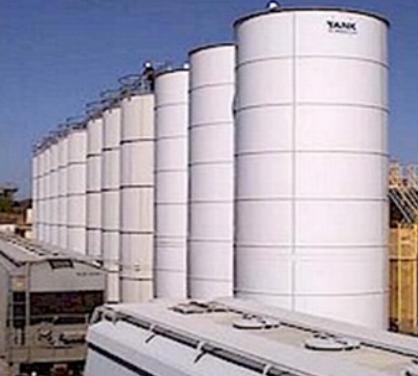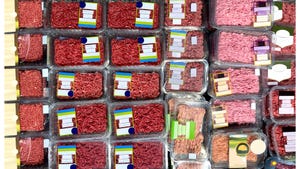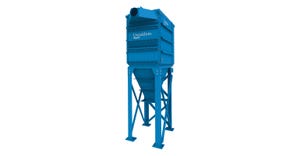Storage Silo Selection for Dry Bulk Applications
July 29, 2013

The process of silo selection starts with a series of questions that require answers before proceeding. This is one of the main problems witnessed in today’s dry bulk storage market. Tank and silo selection many times is based on a preferred “construction type” in lieu of “stored material” performance requirements.
Silo manufacturers tend to process customer information relative to their standard storage products and design parameters, which leaves the client responsible for the outcome. This is an archaic approach that is safe for the vendor, but many times misses the mark in achieving a functional and efficient storage system that performs per your requirements.
The “top 10” list below includes basic considerations that should be addressed on every storage application. If the application under review is routine and no problem areas exist with the stored material or the discharge stream, a standard tank quote can be generated. If any of items listed are a concern, a specialist in integrated storage applications can advise you on the correct approach.
Considerations
1. How much material will be stored...tons? Cubic feet?
2. Are there any unique characteristics of the stored material to consider?
3. What materials of construction should be used?
4. What product density should be used for volume and design calculation?
5. Is material degradation a concern?
6. Is material segregation a concern?
7. What type of material discharge pattern is preferred or required for the application? (i.e., funnel flow, mass flow, expanded flow, etc.)
8. Is a hopper flow aid device required for reliable discharge?
9. Should my material be tested by a “flow specialist?”
10. Do I need a reliable performance guarantee from the silo supplier?
You don’t need to have all the answers, but you do need to know a reliable storage specialist in dry bulk applications that can advise you in these areas. With the basics covered, the selection process can be now be narrowed for customer review and preference.
Example 1: Funnel Flow
We need to store 5000 cu ft of hydrated lime. Based on the capacity requirements as detailed below, a bolted or shop-welded tank is correct for the application. Based on experience with the material and an extensive number of applications in the field, a flow aid device is required. Perhaps a bin activator sized at half the tank diameter will provide reliable material discharge. A bin activator provides a “funnel flow” material discharge pattern. The material does not need to be tested. Material degradation should not be a concern.
Example 2: Mass Flow
Storage application requires 25,000 cu ft of a granular product. It is desired to minimize material segregation during discharge. First we will note that size selection exceeds a shop-welded tank. This eliminates the shop-weld tank, unless we break the capacity requirements into a two-tank package. The correct storage selection is a bolted smooth-wall tank. The correct flow discharge selected is a mass flow bin. This does not mean we specify a silo designed for “mass flow” design loads. The correct request is to specify a silo designed for “functional mass flow” discharge. In order to provide reliable “functional mass flow” (FIFO) discharge, the material will need to be tested.
Tank & Silo Selection
1) Shop-Welded Construction
Applications: Plastic resins, food products, dry chemicals, minerals, wood waste, misc. dry products.
Features of a shop-welded silo or tank are:
* Hopper capacities under 10,000 cu ft
* Shop-controlled quality
* One-piece tank construction
* Factory-applied coating systems
* Increased freight cost to the jobsite
* Less field installation requirements
2) Bolted Smooth wall Flat Panel (FP) Construction
Applications: Cement, fly ash, coal, limestone, lime, aggregates, minerals, chemicals, plastics, select foods, wood waste, misc. dry products.
Features of a bolted smooth wall flat panel constructed silo or tank are:
* Hopper capacities from 1000 – 100,000 cu ft
* Shop-controlled quality
* Modular construction requires bolted field assembly
* Decreased field installation timeframe
* Factory applied powder coating systems
3) Field-Welded Construction
Applications: Minerals, aggregates, dry chemicals, misc. dry products
Features of a field-welded constructed silo or tank are:
* Hopper capacities from 20,000 – 250,000 cu ft
* Shop-controlled quality – minimize large piece count
* Modular construction requires field welded assembly
* Increased field installation timeframe
* Field-applied coating systems
4) Slip & Jump-form Concrete Construction
Applications: Minerals, grains, wood waste, misc. dry products
Features of a concrete construction silo or tank are:
* Hopper capacities from 20,000 – 300,000 cu ft
* Slip-form quality – high - continuous pour, monolith design
* Jump-form construction - cold joint construction
* Increased field installation timeframe
* Increased foundation requirements
5) Hybrid Silo Construction
Applications: Cement, fly ash, coal, limestone, lime, aggregates, minerals, chemicals
Features of hybrid constructed silo or tank are:
* Hopper capacities from 20,000 – 150,000 cu ft
* Shop-controlled quality
* Modular construction requires field assembly
* Decreased field installation timeframe
* Factory-applied powder coating systems
* Combines the best qualities of bolted, field-weld & concrete construction
Other Considerations
In general, dry bulk applications that require a storage volume of less than 10,000 cu ft will utilize a shop-welded or smooth wall bolted silo. Both products are used interchangeably in the industry. Shop-weld and bolted construction maintain advantages as listed above. Under review, the total installed costs (material + freight + field installation) are comparable between both products.
Bolted FP (flat panel), field-weld, concrete and hybrid silos are typically utilized in large-volume storage applications. All four designs are routinely specified in the power industry. In the industrial market, bolted FP and hybrid construction are the most cost-efficient silo designs. Field-weld and concrete construction require extended field installation timeframes, which equates to higher installed cost.
Relative to steel and alloy “materials of construction” selection, bolted, shop-weld, and field-weld silos are available in coated carbon steel, stainless steel, and aluminum construction. All tanks/silos are customized for the application and are available with full skirt support, leg supports, structure supports, or lug supports.
Typical silo accessories include a filter flange connection for dust control, level control nozzles, manway access into silo deck and hopper areas, maintenance access platforms, caged ladders, spiral stairways, perimeter guardrails, pressure vacuum relief devices, and custom requirements for system integration.
Summary
In summary, if the basics are covered in storage silo selection, years of trouble-free containment and reliable discharge can be expected. In today’s industrial market, a storage specialist should advise or confirm your selection. In all cases, a reliable integrated storage system starts with a properly designed and configured silo. Guesswork has been removed from the equation.
About our author
Bill Neighbors is president, Tank Connection LLC (Parsons, KS). Tank Connection is a leading designer, manufacturer, and installer of storage containment products and field construction services. Tank Connection offers all types of steel tank construction, with more than 100 different types of storage containment products tailored specifically for the application. For more information, visit www.tankconnection.com.
Bill Neighbors
Tank Connection
1801 S. 21st St.
Parsons, KS 67357
Phone: 620-423-3010
Fax: 620-423-3999
E-mail: [email protected]
Web site: www.tankconnection.com
Read more Powder Perspectives
You May Also Like


